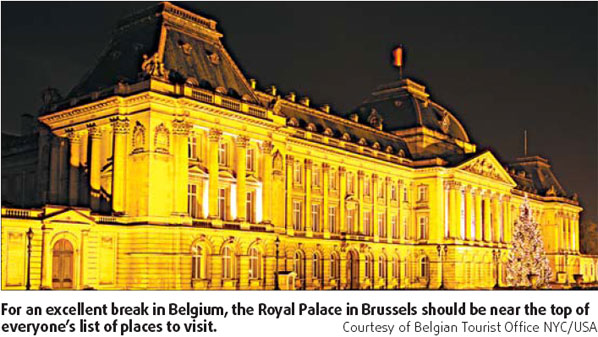Despite accommodating both the headquarters of NATO and the European Union, Belgium does not get much attention on the world scene. Often, its larger and louder neighbors Germany and France tend to steal the spotlight.
But even if Belgium, one of the world's political centers, is not always recognized as such, the country is easily associated with culinary treats like world-class chocolate and a vast variety of superb breweries.
From the quaint fruity raspberry beer to the wealth of white and dark beers, Belgium boasts an unparalleled diversity of breweries resulting in over 500 varieties of beer.
Also, Belgium is often dubbed the world's premier producer of luxury chocolate, alongside Switzerland.
Aside from chocolate and specialty beer, Belgium is culturally, linguistically and politically a divided country with Flemish, German and French speaking groups. The population of about 10.5 million shares the artificially created area of 30,528 sq km called Belgium.
Like its infrastructure, Belgium's economy is heavily intertwined with the rest of Europe. The country's location, at the center of a highly industrialized region, explains why it is one of the world's 10 largest trading nations.
The population density of Belgium, 342 per sq km, is one of the highest in Europe, only surpassed by the Netherlands and Monaco.
Almost all of the Belgian population is urban. About 10 percent of the population lives in Brussels, Belgium's capital and the only officially bilingual part of the country.
Belgium's two largest regions are the Dutch-speaking region of Flanders in the north, with 58 percent of the population, and the French-speaking southern region of Wallonia, inhabited by 32 percent. The German-speaking community is relatively small.
Belgium's linguistic and cultural diversity can also be seen in the country's complex system of government.
The complex society and the intricate system of government recently resulted in worldwide headlines as 196 days after the last Belgian election, politicians still had not been able to find consensus to form a government. Instead, a temporary government will lead the country for a limited period.
This, however, is not the first time that Belgium has had this problem. In the 1988 election, the country was without a government for 148 days.
In terms of culture, Belgium benefits from easy access to some of the cultural capitals of Europe such as Berlin, London and Paris. The Royal Museum of Fine Arts of Belgium in Brussels hosts works by several of the great European masters of art.
Famous names in the classic tradition include the Flemish artists Jan van Eyck, Rogier van der Weyden and Pieter Brueghel the Elder. Belgium was also the home of surrealist artist Ren Magritte (1898-1967), famous for his painting of a pipe with "this is not a pipe" written on it in French.
Famous actors born in Belgium include Audrey Hepburn (1929-1993) and Jean-Claude Van Damme. Other famous Belgians are Henri La Fontaine, who earned a Nobel Peace Prize in 1913 as well as Herg, the creator of the comics The Adventures of Tintin.
Aside from high quality beer and chocolate, Belgium is home to the invention of a few culinary classics. For example, both waffles and French fries are said to originate from Belgium.
(China Daily by Ida Relsted February 1, 2007)


